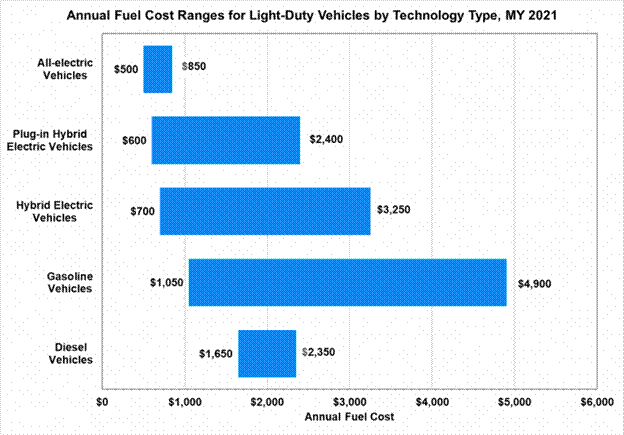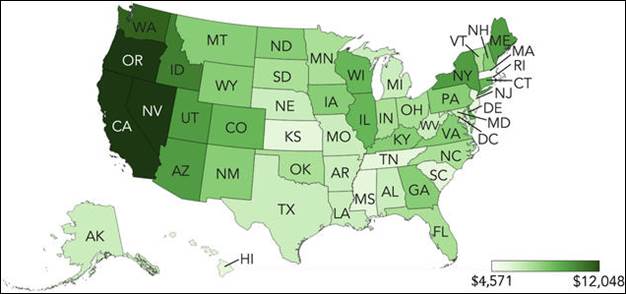With gasoline prices climbing back well above $3 per gallon, the economics of driving an electric vehicle have never looked better.
It’s already true that EVs pay back their higher sticker prices with significantly lower fuel and maintenance costs. Now, with gas prices approaching $3.50 per gallon here in northern New England, it costs twice as much to fuel a gasoline-powered vehicle than to charge an EV, according to the Department of Energy’s eGallon.com website.
| Avg. gasoline price (regular) | Equivalent EV charging rate (residential) | ||
| New Hampshire | $3.37/gallon | $1.70/gallon | |
| Vermont | $3.44/gallon | $1.76/gallon | |
| Massachusetts | $3.42/gallon | $1.96/gallon |
Source: U.S. Department of Energy “eGallon” electricity rates quoted as of 3/21/21. AAA state average gasoline prices quoted as 11/27/21.
Even before this latest jump in gasoline prices, EVs have been giving far more bang for the buck than at the pump. At the start of this year, when gasoline prices were averaging just $2.39 per gallon, the DOE put the average fuel cost for operating a new gasoline-powered vehicle at $1,050 to $4,900 per year, compared to just $500 – $850 in annual charging costs for a new EV. (This calculation assumes 15,000 annual vehicle miles traveled.)
Annual Fuel Cost Ranges for Light-Duty Vehicles

Source: U.S. Department of Energy and U.S. Environmental Protection Agency, Fuel Economy Data, accessed January 29, 2021.
EV Charging Saves You Money!
Other recent studies confirm EVs’ growing cost advantage over internal combustion engines. Last year, Consumer Reports assembled a 45-page cost comparison that found EVs produce more than $4,700 in fuel savings, on average, over the first seven years of vehicle ownership. With only 20 or so moving parts, EVs also have lower maintenance and repair costs that add another $6,000 – $10,000 in cost savings over the life of the vehicle.
Another major study from the University of Michigan’s Transportation Research Institute found that the average cost to operate an EV was only $485 in 2018, compared with $1,187 in average operating costs for a gasoline-powered vehicle. Over the vehicle’s lifetime, this translates into $10,000 or more in cost savings for EV drivers living in the Northeast and on the West Coast, where gas prices are higher than the national average.
Lifetime Fuel Cost Savings for EV Owners by State

Home Charging Makes the Difference
One important caveat in these comparative studies is that they assume EVs get charged mainly at home, not on the road. While public charging stations are growing in number, thanks in part to the giant infrastructure bill billing rates typically range from $0.30 to $0.80/kWh – far above most residential utility rates.
Breaking this down a bit further, a Level 1 home charging station, which allows drivers to plug into a conventional 120-volt wall outlet, usually spins the utility meter at a rate of less than $0.20/kWh. The downside is that the charging time for a Level 1 system is slow – requiring up to 20 hours for an EV with extended range. A Level 2 charger, using 240-volt outlet, can cut this charging time to just a few hours.
Still, when you consider the higher costs of using public charging stations – and the time spent driving “deadhead miles” just to find one – most EV owners are better off avoiding them altogether. Or at least that’s the conclusion of another recent study from a Michigan-based consultant, who pays $0.17/kWh to charge his EV at home, and anywhere from $0.33-$0.66/kWh when he’s in need of a jolt on the road.
Even with this reliance on public charging stations, however, EVs maintain their fuel-cost advantage when a gas-powered car’s fuel economy drops below 26 mpg and gas prices rise above $3.25 per gallon. (This consultant’s analysis also factors in a modest EV sales tax that is assessed in the state of Michigan.)
And let’s not forget the planet in this equation! Regardless of how your pocketbook shakes out, public charging stations are still only as climate friendly as the grid they rely on. As we reported in a recent post, public charging stations here in northern New England use mainly a mix of nuclear power, large-scale hydro from Quebec, natural gas – and even some coal.
That leaves EV owners with one clear choice: For the cheapest “fill-ups,” charging at home makes the most financial sense. And for the cleanest fill-ups, charging at home with solar power makes the most climate sense. This harnessed sunshine is carbon-free, highly affordable, and immune to the price shocks we’re seeing now at the pump and on the grid.
Looking forward, the energy stored in EV batteries may even become a significant source of supply for the grid, especially at times of peak demand. With traditional utility economics turned on its head, a whole new profit opportunity is emerging for EV owners — especially when they charge with solar power. We’ll explore that value proposition further in a future post.
Solaflect is your home energy management partner. We help you install clean and affordable solar electricity and home battery storage systems for a more resilient and climate-friendly future. Contact us or call (802) 649-3700, or text (802) 308-3018. Working together, the power is in our hands to make a difference.




